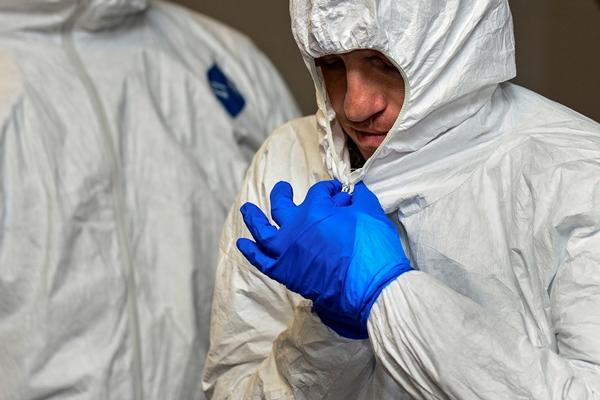The two-star Army general and members of his staff who led the initial military efforts against Ebola in West Africa have been isolated on post as they returned to Italy, the Pentagon said Monday.
Maj. Gen. Darryl Williams, the commander of U.S. Army Africa, and 11 soldiers on his staff were taken to a building on the U.S. base at Vicenza, Italy, where they will be held in isolation for as long as 30 days on orders of the Department of the Army, the Pentagon said.
Army Col. Steve Warren, a Pentagon spokesman, did not use the word "quarantine" to describe the status of Williams and his troops, but said they were undergoing "enhanced monitoring" and were not allowed to leave the building or have contact with family members.
Other U.S. Army Africa troops returning to Vicenza later this week were also expected to be isolated, Warren said.
In a statement, the Defense Department said that the isolation order from the Army came "out of an abundance of caution." So far, none of the soldiers have shown any Ebola symptoms, the deadly virus that has spread across the West African nations of Liberia, Guinea and Sierra Leone.
The Army's order went beyond the Pentagon's initial guidelines for troops returning from Operation United Assistance in West Africa.
Warren said he did not know whether the Italian government had weighed in on the issue of returning troops and influenced the Army's decision. However, Italian security officers in hazmat suits reportedly met the plane that brought Williams and his troops to Vicenza.
Williams had ended his mission in Monrovia, the Liberian capital, on Sunday by turning over the command in West Africa to Army Maj. Gen. Gary Volesky, commander of the 101st Airborne Division.
Williams and Pentagon officials previously had said that only troops showing signs of the virus would be quarantined and then returned immediately to the U.S. by special aircraft for treatment.
Warren could not immediately say whether the other services might take action similar to the Army's for returning troops.
Hagel, Williams, Volesky and Army Gen. David Rodriguez, commander of the U.S. Africa Command, have repeatedly stressed that the estimated 4,000 U.S. troops expected to deploy to West Africa will not be in direct contact with Ebola victims but will focus their efforts on building treatment facilities and moving supplies and medical personnel into the region.
According to the World Health Organization, the death toll from Ebola in West Africa was approaching 5,000 and the number of infections had passed 10,000.
The quarantine issue has risen in the U.S. following the death from Ebola in Dallas of a Liberian man, Thomas Eric Duncan, and the infections of two nurses who treated him - Nina Pham and Amber Vinson.
The order to isolate the soldiers in Italy followed work in New York and New Jersey to come up with uniform guidelines on civilian medical personnel returning from treating Ebola victims in West Africa.
Last week, Craig Spencer, a 33-year-old doctor who had treated Ebola victims in Guinea while working for Doctors Without Borders, was confirmed as having contracted Ebola and was being treated in isolation at Bellevue Hospital in Manhattan.
On Sunday, Gov. Andrew Cuomo, D-New York, and New York City Mayor Bill de Blasio announced new quarantine guidelines that will allow health care workers who have had contact with patients infected with Ebola to stay at home for 21 days, rather than at a medical facility.
Gov. Chris Christie, R-New Jersey, said in Twitter Sunday night that New Jersey residents who exhibited no symptoms of Ebola would be quarantined at home for at least 21 days.
-- Richard Sisk can be reached at Richard.Sisk@military.com





























